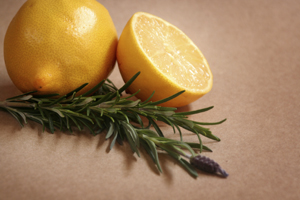
Rosemary is a fragrant, tasty addition to culinary dishes such as chicken and lamb, but new scientific research has now found it is also good for the brain.
by Joanne Henning Tedesco —
Rosemary is a shrubby evergreen bush that, according to folklore, takes its name from the Virgin Mary, who draped her cloak over a bush, placing a white flower on top of it. By the following morning, the flower had turned blue and, thereafter, the plant was known as the “Rose of Mary.” It has grown in the Alps since the Middle Ages and, according to European folk medicine, was thought to help the nervous system and ward off sickness.
Today, research is finding there is more truth than fiction to this tale. Rosemary is a fragrant, tasty addition to culinary dishes such as chicken and lamb, but new scientific research has now found it is also good for the brain. A collaborative group from the Burnham Institute for Medical Research in La Jolla, Calif., and the Iwate University in Japan, reports that the herb rosemary contains an ingredient that fights off free-radical damage in the brain.
This active ingredient in rosemary, known as carnosic acid, can protect the brain from stroke and neurodegeneration caused by chemical free radicals. These injurious radicals are thought to contribute not only to stroke and neurodegenerative conditions such as Alzheimer’s, but also to the ill effects of normal aging on the brain.
In The Journal of Neurochemistry and Nature Reviews Neuroscience, scientists report for the first time that carnosic acid activates a novel signaling pathway that protects brain cells from the ravages of free radicals. In animal models, the scientific group, led by Drs. Takumi Satoh (Iwate University) and Stuart Lipton (Burnham Institute), found that carnosic acid becomes activated by the free-radical damage itself, remaining innocuous unless needed — exactly what is wanted in a drug.
The scientists call this type of action a “pathological-activated therapeutic” or PAT drug. “Pat” also represents a gentle tap and not the heavy sledge hammer that some drugs produce, including significant side-effects in areas of the body where their effects are neither needed nor wanted.
According to Lipton, “Moreover, unlike most new drugs, this type of compound may well be safe and clinically tolerated because it is present in a naturally occurring herb that is known to get into the brain and has been consumed by people for over a thousand years.” Lipton is also a practicing neurologist at the University of California-San Diego and, therefore, knows first-hand that such drugs are critically needed for care of aging and neurologically ill patients.
Source: mercola.com and the Burnham Institute.
Here are some chicken and rosemary recipes for you to try.
Chicken Roasted with Lemon and Rosemary
Ingredients:
- 2/3 cup lemon juice, freshly squeezed
- 2 tablespoons olive oil
- 3 tablespoons crushed black peppercorns or coarsely ground pepper
- 4 tablespoons fresh, chopped rosemary or 2 tablespoons dried rosemary
- whole chicken
- 1 whole lemon, halved
- 4 sprigs fresh rosemary
Instructions:
Combine lemon juice, olive oil, pepper and chopped rosemary for the marinade. Pour over chicken and marinate in the refrigerator for at least 3 hours or overnight. Place lemon halves and rosemary sprigs in cavity of chicken. Roast chicken in a 425 F. oven for 15 minutes per pound. Do not open oven or baste chicken during roasting. If chicken pieces are to be grilled, grill for approximately 20 minutes, turning once. Legs and thighs should be grilled an additional 5 minutes, or until meat is no longer pink. Serves 4.
Rosemary Chicken
Ingredients:
- 6 chicken breasts, boneless and skinless
- 2 tablespoons fresh rosemary, chopped
- dash of salt and pepper
- 1 tablespoon vegetable oil
- 1 lemon, sliced
Instructions:
Lay chicken in a cooking dish and sprinkle all ingredients evenly over the breasts. Refrigerate for one hour. Preheat oven to 400 F. Lay lemon slices over chicken and bake for 45 minutes. Serves 6.
Marinated Rosemary Lemon Chicken
Ingredients:
- 1/2 cup lemon juice
- 2 tablespoons olive oil
- 4 tablespoons fresh rosemary, chopped; reserve stems
- 4 boneless and skinless breast fillets
- 1 lemon, sliced
Instructions:
In a large resealable plastic bag, mix lemon juice, olive oil and rosemary. Place chicken and lemon slices in bag. Seal, and shake to coat. Marinate in refrigerator 8 hours or overnight. Preheat grill for high heat. Lightly oil the grill grate. Discard marinade, and grill chicken 8 minutes per side, or until juices run clear. If you use fresh rosemary sprigs, throw stems onto the coals to give chicken even more of a smoky rosemary flavor.





July 15, 2012
Alzheimer's and Dementia, Anti-aging, Food, Heart disease, Herbs and Spices, Recipes